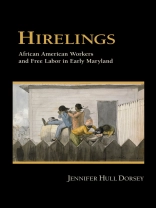In Hirelings, Jennifer Dorsey recreates the social and economic milieu of Maryland’s Eastern Shore at a time when black slavery and black freedom existed side by side. She follows a generation of manumitted African Americans and their freeborn children and grandchildren through the process of inventing new identities, associations, and communities in the early nineteenth century. Free Africans and their descendants had lived in Maryland since the seventeenth century, but before the American Revolution they were always few in number and lacking in economic resources or political leverage. By contrast, manumitted and freeborn African Americans in the early republic refashioned the Eastern Shore’s economy and society, earning their livings as wage laborers while establishing thriving African American communities.
As free workers in a slave society, these African Americans contested the legitimacy of the slave system even while they remained dependent laborers. They limited white planters’ authority over their time and labor by reuniting their families in autonomous households, settling into free black neighborhoods, negotiating labor contracts that suited the needs of their households, and worshipping in the African Methodist Episcopal Church. Some moved to the cities, but many others migrated between employers as a strategy for meeting their needs and thwarting employers’ control. They demonstrated that independent and free African American communities could thrive on their own terms. In all of these actions the free black workers of the Eastern Shore played a pivotal role in ongoing debates about the merits of a free labor system.
Jadual kandungan
Introduction
1. Work
2. Migration
3. Family
4. Dependency
5. Community
6. Recession
ConclusionNotes
Bibliography
Index
Mengenai Pengarang
Jennifer Hull Dorsey is Associate Professor of History and Director of the Center for Revolutionary Era Studies at Siena College in Albany, New York.












